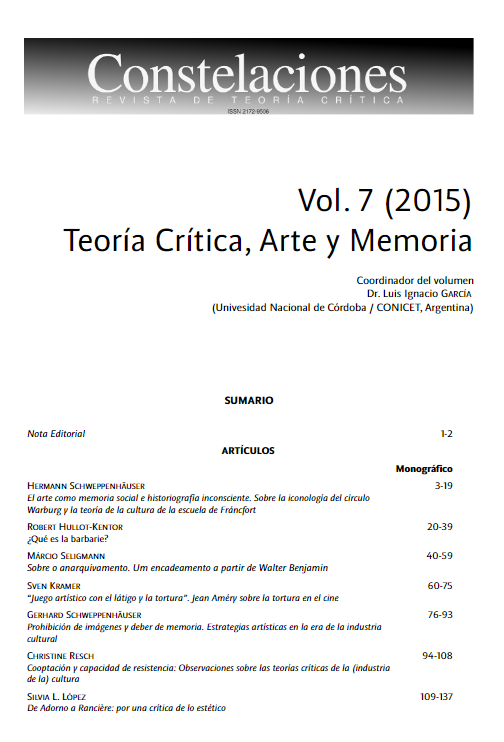On the Anarchivation. A Concatenation from Walter Benjamin
Keywords:
anarchivation, culture as archive, collectionAbstract
The article makes an analyses of a series of artworks, specially those made after de Second World War, as a way to propose the archive as a key idea to understand what happens with our culture today. In the 20. century the melting process of the central archive of the western though opened a period of recollection of the archives. The biological turn has enthroned the notion of genetic inheritance and of reinstatement of the inherited archives. On the other hand, the cybernetic turn has generalized speeches about memories, archives, recording, erasing, and deleting information. Many artists, in this landscape, since the Romanticism, have been developing combat strategies against the monological procedures of archiving and of the archival science: they became anarchivists.Downloads
Downloads
Published
How to Cite
Issue
Section
License
Authors who have publications with this journal accept the following terms:
1. Authors will retain their copyright and grant the journal the right of first publication of their work, which will be simultaneously subject to the License of recognition of Creative Commons CC BY-NC-SA 4.0 that allows third parties to share, redistribute and adapt the work provided it is for non-commercial purposes and its author and first publication in this journal is indicated.
2. Authors may adopt other non-exclusive distribution license agreements for the version of the published work (e.g., depositing it in an institutional electronic archive or publishing it in a monographic volume) provided that the initial publication in this journal is indicated.
3. Authors are permitted and encouraged to disseminate their work via the Internet (e.g., in institutional telematic archives or on their website) before and during the submission process, which can produce interesting exchanges and increase citations of the published work. (See The Effect of Open Access).
Data confidentiality
1. Constelaciones. Revista de Teoría Crítica guarantees that the data you send us will only be used to meet the requests made in this message.
2. Your data will not be passed on to third parties.
3. You may request that your data be removed from our records at any time.





